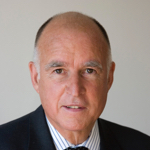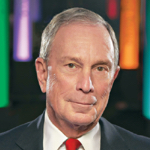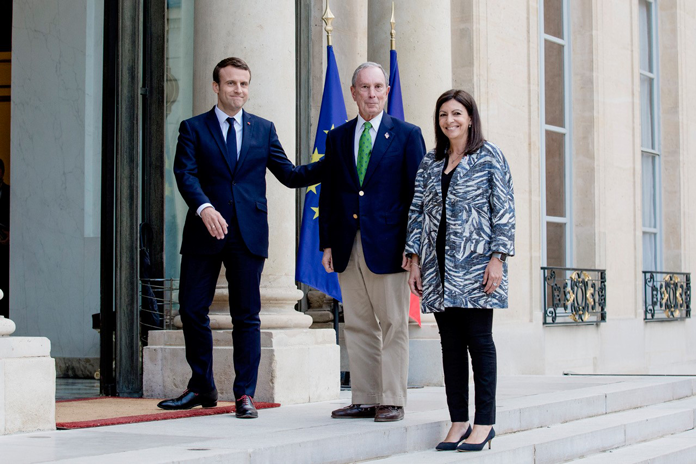About America’s Pledge
In the wake of the Trump Administration’s decision to pull out of the Paris Agreement, an unprecedented number of U.S. cities, states, businesses, and universities have reaffirmed their commitment to helping America reach its Paris climate goals.
Whether through declarations like We Are Still In or new pledges and commitments of their own, these non-national actors are maintaining U.S. momentum on climate action in the absence of federal leadership. In July 2017, former New York City Mayor Michael Bloomberg and California Governor Jerry Brown launched the America’s Pledge initiative, which will aggregate and quantify the actions of states, cities and businesses and other non-national actors in the United States to drive down their greenhouse gas emissions consistent with the goals of the Paris Agreement.
America’s Pledge aims to:
Collect data on non-national climate action to quantify and report on progress made towards the US pledge (Nationally Determined Contribution) under the Paris Agreement
Communicate the findings and results of our research and data collected from non-national actors to the international community and the United Nations
Catalyze further climate action in the near term by providing detailed roadmaps for similar business-level, city, and state action in the US and, potentially, in other countries around the world
Leadership

Jerry Brown, Governor of California
Jerry Brown was sworn in as governor of California on January 3, 2011, and was reelected in 2014.
Brown previously was elected governor in 1974 and served two terms, during which time he established the first agricultural labor relations law in the country, started the California Conservation Corp and promoted renewable energy. In 1970, he was elected California secretary of state. Brown began his career as a clerk at the California Supreme Court. In 1998, he reentered politics and was elected mayor of Oakland, serving two terms from 1999 to 2007. Brown founded the Oakland School for the Arts and the Oakland Military Institute.

Michael Bloomberg, Founder of Bloomberg LP and Bloomberg Philanthropies, and three-term mayor of New York City
Michael Bloomberg is the founder of Bloomberg LP, a global media and financial services company. He served as mayor of New York City from 2002-2013, earning a reputation for independence and innovation. In 2014, the UN Secretary-General appointed him Special Envoy for Cities and Climate Change, and he leads the boards of numerous climate-related organizations and is the co-author of “Climate of Hope: How Cities, Businesses, and Citizens Can Save the Planet.” He is one of the world’s most prominent philanthropists, and the environment is one of the five main focus areas of his foundation, Bloomberg Philanthropies.
Letter from Michael Bloomberg

Letter of Michael R. Bloomberg to United Nations Secretary-general António Guterres & Executive Secretary of the UN Framework Convention on Climate Change Patricia Espinosa
Dear Secretary-General Guterres and Executive Secretary Espinosa,
I am submitting the attached statement from U.S. subnational and non-state actors to affirm and demonstrate Americans’ collective commitment to the Paris Agreement and to supporting climate action to meet the nationally determined contribution made by the United States under that accord.
The bulk of the decisions which drive U.S. climate action in the aggregate are made by cities, states, businesses, and civil society. The federal role, ideally, is to coordinate and support those efforts. In the absence of a supportive federal coordinating role, these actors will more closely coordinate their own decarbonization actions. Collectively, they will redouble their efforts to ensure that the U.S. achieves the carbon emissions reductions it pledged under the Paris Agreement.
Since 2007, when economy-wide emissions peaked, the United States has been reducing its emissions at a rate which, if sustained through 2025, would achieve almost the full amount of our Paris commitment. That rate of progress, which has been driven not by Washington policies but by actions taken by cities, states, businesses, and civil society, has been accelerating for the past three years. We do not intend to slow down. Indeed, we are confident that emissions reductions in the United States will accelerate over the coming years as a result of the growing ambition for climate action by cities, states, businesses, and others. These groups recognize not just the urgency of the climate change threat, but the enormous economic opportunity presented by climate change action.
In my capacity as the United Nations Secretary-General’s Special Envoy for Cities and Climate Change, I plan to work with U.S. subnational and non-state actors over the coming months to follow-up on this submission with a more specific quantification of these aggregate actions. This quantification, which will constitute “America’s Pledge” to the world, will reflect our collective resolve to combat climate change and fulfill our responsibility to help lead the world in reducing emissions. And, as the Global Covenant of Mayors has already done for its activities, I will support the necessary initiatives to make the American contribution to the Paris Agreement transparent and accountable.
It is my hope that the UNFCCC, on behalf of the Parties to the Paris Agreement, will accept and acknowledge America’s Pledge as a parallel submission alongside any future submission provided to you by the current executive branch of the U.S. federal government. That branch can, and will, speak to its own willingness to move forward on climate action in the United States. It cannot, however, determine the pace of progress achieved by U.S. cities, states, the private sector, and civil society. That freedom to lead is part-and-parcel of our federal system – and in combatting climate change, we will capitalize on it to the fullest extent.
